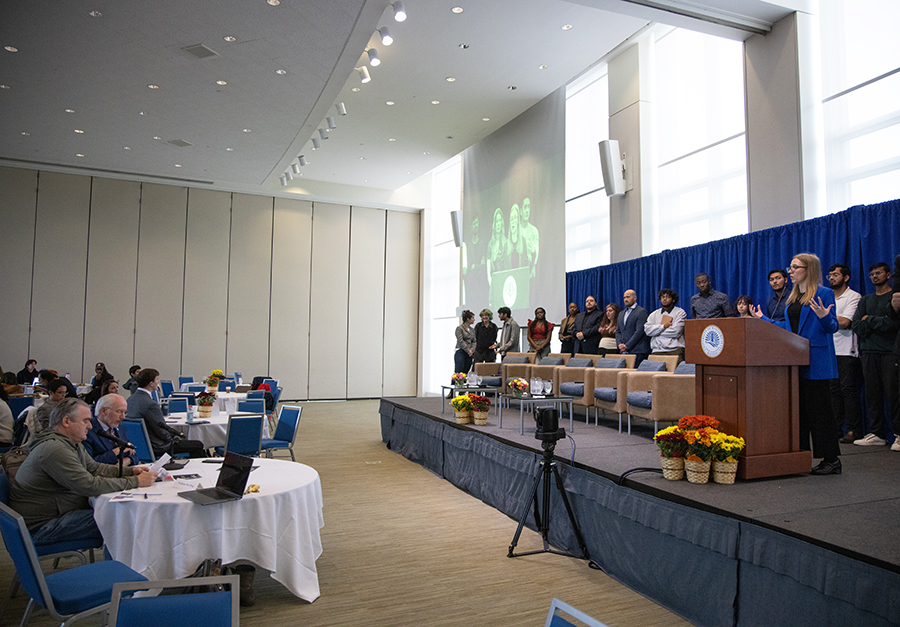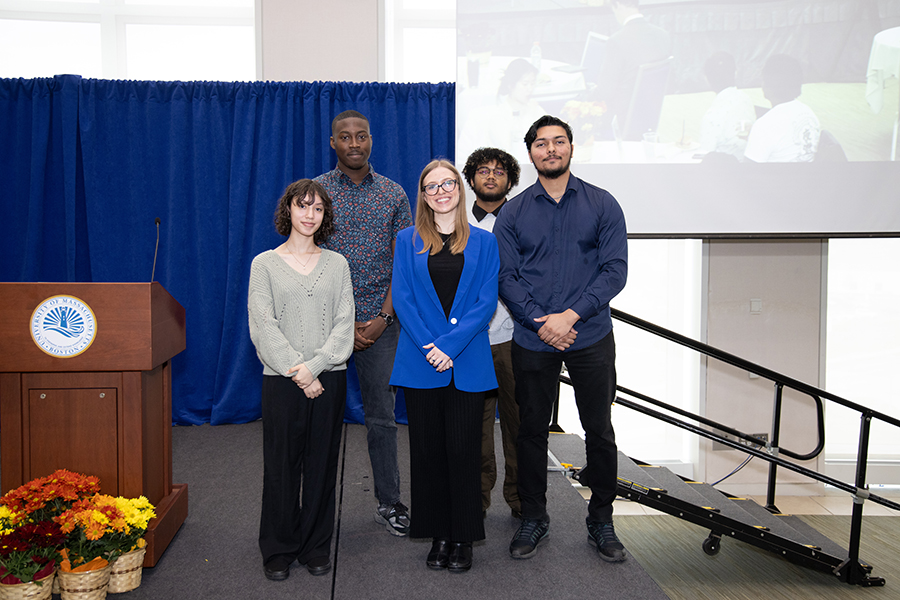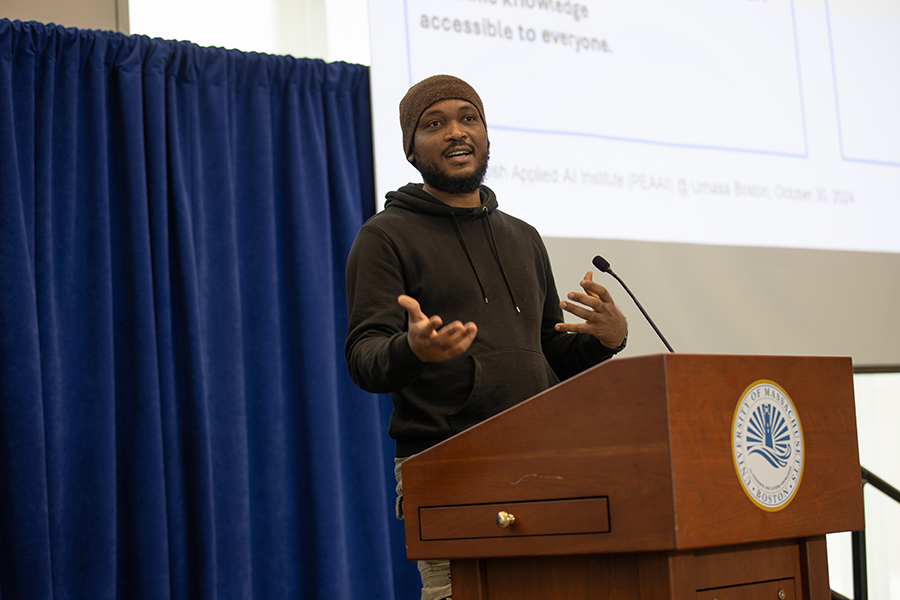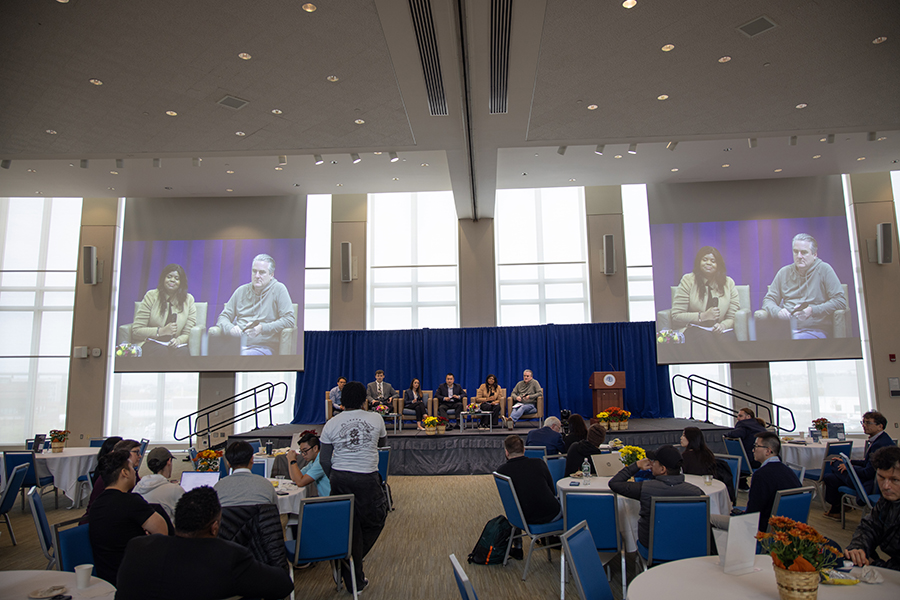- Home
- News
- Recent News
- UMass Boston Hosts Inaugural Paul English Institute AI Symposium and Hackathon
UMass Boston Hosts Inaugural Paul English Institute AI Symposium and Hackathon
UMass Boston’s Paul English AI Institute recently hosted AI for All, an event showcasing an AI Applications Hackathon, student presentations, and a panel discussion, all designed to foster collaboration, creativity, and ethical AI application.

The hackathon competition drew 16 interdisciplinary teams of graduate and undergraduate students across the university to develop their innovative ideas that address real-world challenges, everything from health care and education to the tech sector and everyday life, using AI tools and applications.
Four groups were selected to present their ideas to Provost Joseph Berger and distinguished alumnus Paul English ’87, G’89, H’19—a tech entrepreneur, co-founder, and philanthropist who founded the university’s AI institute.
The Technovators won first place for their project Beacon Pathway.
Inspired by the need to streamline student access to resources, The Technovators developed a user-centered platform to help students navigate academic and career opportunities. The group consisted of students Michael Agbesi (IT), Ciara Santiago (Psychology), David Martinez (IT), Olivia Moos (Computer Engineering), and Mustafa Ahmed (Computer Science).

“There are students from different backgrounds who need help finding resources that can best support their career aspirations,” the team explained during their presentation.
Runners-up included The Empathy Architects, Patient Proxy, and AI and Mental Health: Addressing the Therapy Gap. Watch their presentations here.
Provost Berger highlighted the broader mission of the hackathon, emphasizing the importance of democratizing AI.
“The purpose of the hackathon isn't just to develop new ideas and new apps and think about how best to apply artificial intelligence; it's about how to help all of us challenge ourselves to learn new skills, new abilities,” Berger said. “AI changes the very fundamental nature of how we work and learn, so at UMass Boston it is important that we tap into the amazing talent that we have in our students and our faculty and begin to build a platform that draws our entire community into the use of AI, that advances the use of AI in teaching, in learning, in career preparation, not just learning while you are all students here but throughout the rest of your life.”
The hackathon was organized by the AI Institute’s Student Advisory Council (SAC), which formed this past spring. The SAC is comprised of students across academic disciplines and works closely with the Institute’s Executive Director and Distinguished Professor of Computer Science, Wei Ding, to design learning and engagement opportunities for their fellow students.

Students from all academic disciplines were also given the opportunity to present for one minute – either an abridged presentation of their AI project, connecting AI to their major, addressing ethical considerations and challenges, or other AI-related ideas. Watch the presentations here.
The event also featured a panel discussion on “Mentoring the Next Generation: Faculty and Industry Perspectives on Democratizing AI in Education and Beyond,” where faculty and industry leaders shared insights on how they use AI in their curriculum, and the idea of balancing AI’s potential while still focusing on critical thinking skills.
The panel featured Paul English; Xiaohui Liang, associate chair of the Computer Science Department; Rosemary Samia G'18, director of the Center for Clinical Education & Research; Cody Turner, a postdoc in the Applied Ethics Center & Institute for Ethics and Emerging Technologies; and Tim Zeng, associate professor in the Curriculum and Instruction Department. PhD candidate Nyingilanyeofori (“Nyingi”) Hannah Brown moderated the discussion.

Turner stressed the importance of preparing students not only to use AI but to develop independent reasoning skills, giving them an edge as others become overly dependent on the technology.
“I just think it's a balance between teaching students to use AI to help equip them for the job market but without sacrificing their critical thinking and independent reasoning abilities,” he said. “We could find ourselves in a situation 10 years from now where companies are getting applicants who are super proficient at using AI, but when they don't have the AI next to them you know it's evident that their critical thinking abilities haven't kept up to pace.”
English ended the event by giving advice to students who are starting their career journeys as AI becomes the new reality in the workplace.
“Over my career as an engineer I've seen the invention of the desktop computer, the invention of the internet, many years later the invention of the web, the invention of mobile phones. I've seen a lot of revolution in my career. AI is bigger than anything I've seen before, and AI is going to change every single job,” English said.
He encouraged students entering the workforce to try to find an employer that's AI forward, who cares about AI and wants you to use AI in your job.
“And make sure you do that because you want to be sort of in the front of the wave, not behind it,” he said. “Given that this is the biggest revolution in decades I think I would just go all in and find a way to use AI every day. Ask your friends how they're using it, ask the students how they're using it, and find jobs that want you to use these tools.”
